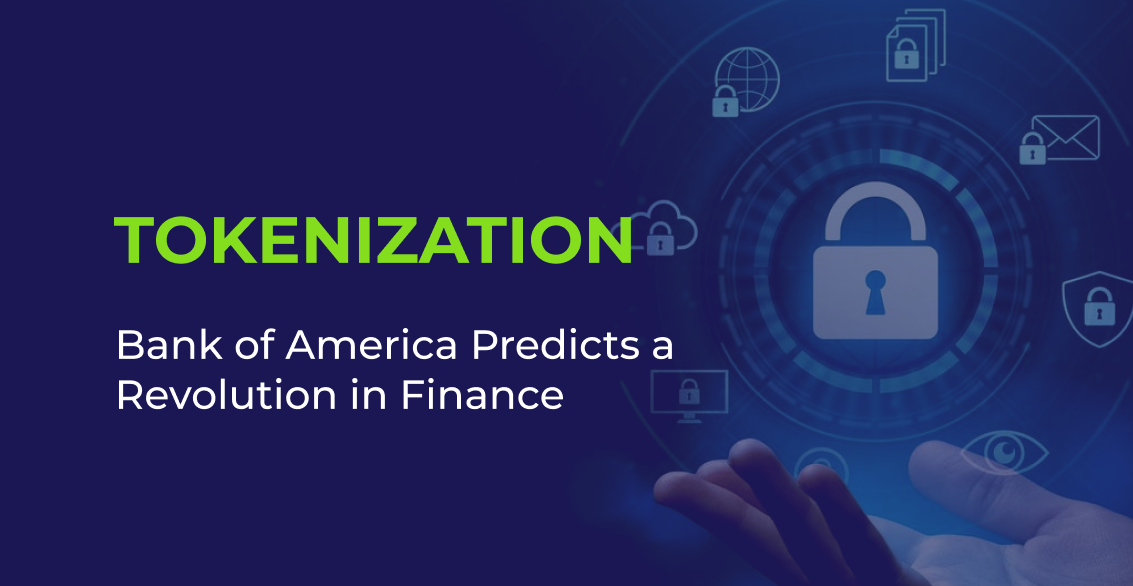Bank of America (BofA) has released a research report that envisions a transformative future for tokenization in finance. According to their findings, tokenization, an application of blockchain technology, has the potential to revolutionize both financial and non-financial markets within the next five to 15 years. This article will explore the power of tokenization, its implications for various sectors, and how it is poised to reshape the digital realm.
Tokenization: Transforming the Digital Landscape
Tokenization is the process of converting real-world assets or rights into digital tokens on a blockchain network. These tokens represent ownership, value, or other rights, providing a secure and transparent means of tracking and transferring assets. BofA’s Cryptocurrencies Research Team believes that tokenization is on the cusp of an infrastructure revolution that will redefine how value is transferred, settled, and stored across industries.
The research report emphasizes that tokenization has the potential to reshape how assets are managed and traded in the coming decade. By leveraging this technology, businesses can enhance efficiency, increase liquidity, and reduce transaction costs across various markets. The analysts at Bank of America explain that tokenizing traditional assets and issuing them in digital form can optimize capital allocation, catalyze the growth of software-as-a-service (SaaS) companies, and drive mainstream adoption.

Streamlining Financial Infrastructure
Tokenization offers significant advantages for financial infrastructure. By digitizing assets and representing them as tokens, the traditional complexities associated with intermediaries and paperwork can be minimized. This streamlined approach to settlement, clearance, and custodial services enables faster and more efficient transactions. Bank of America anticipates that these improvements in financial infrastructure will accelerate the adoption of digital assets in the mainstream.
Bank of America highlights that the adoption of disruptive technologies historically took decades. However, the report suggests that the mainstream adoption of digital assets will happen at a much faster pace. The bank expects financial institutions and corporations to rapidly implement blockchain technology due to the untapped efficiencies it offers. Distributed ledger technology and tokenized traditional assets are seen as key drivers of this acceleration.
The Digital Realm
While some tokens may lack inherent value, they can still attract attention by representing a community’s value. Memecoins like Shiba Inu (SHIB) and Pepecoin (PEPE) serve as examples. However, the report acknowledges that certain tokens do possess distinct purposes. Public permissionless blockchains, such as Bitcoin, Ethereum, and some third-generation blockchains, rely on tokens as incentives for participants involved in processing transactions within the network. These tokens play a crucial role in the decentralized nature of these networks.
While tokenization’s impact on the financial industry is significant, its potential extends beyond traditional finance. The report by Bank of America highlights the broader implications of tokenization across non-financial sectors as well. Let’s explore some key areas where tokenization can bring transformative change.
Supply Chain Management
Tokenization can optimize global supply chains by enhancing transparency and traceability. By representing physical assets or components as digital tokens, companies can streamline logistics, reduce fraud, and improve inventory management. Additionally, smart contracts enabled by tokenization can automate payment settlements, ensuring faster and more secure transactions.
Intellectual Property Rights
It provides a secure and transparent way to tokenize intellectual property rights, such as patents, copyrights, and trademarks. By representing these rights as digital tokens, ownership and licensing can be easily tracked, verified, and transferred. This opens up new opportunities for creators, inventors, and artists to monetize their intellectual assets efficiently.
Real Estate
It has the potential to revolutionize the real estate industry by fractionalizing property ownership. Through the issuance of digital tokens representing shares in a property, tokenization enables fractional ownership, making real estate investments more accessible to a broader range of investors. This can increase liquidity in the market and potentially reduce barriers to entry for individuals looking to invest in real estate.
Art and Collectibles
Tokenization can democratize the art and collectibles market by allowing fractional ownership and easier transfer of ownership. Digital tokens can represent shares in valuable artwork or collectible items, enabling investors to participate in the market without having to purchase entire pieces. This opens up new possibilities for art enthusiasts and collectors, while also enhancing liquidity in the market.
Gaming and Virtual Assets
It can transform the gaming industry by providing players with true ownership of in-game assets. By tokenizing virtual items, players can buy, sell, and trade assets securely on blockchain platforms. This introduces new economic models within games and creates opportunities for players to monetize their gaming skills and virtual assets outside of the game ecosystem.
The Future of Tokenization
The tokenization continues to gain momentum and it’s essential to address the challenges and potential risks associated with its widespread adoption. Regulatory frameworks, security considerations, and scalability are among the key areas that require attention to ensure the responsible and effective implementation of tokenization.
Regulatory Frameworks
As it intersects with traditional financial systems and regulations, it becomes crucial to establish clear guidelines to govern tokenized assets. Regulatory bodies worldwide are actively exploring frameworks to ensure compliance, investor protection, and the prevention of illicit activities. Striking a balance between innovation and regulation will be crucial to fostering the growth of tokenization.
Security Considerations
Tokenization brings unique security challenges, as digital assets are susceptible to hacking and theft. Robust security measures, including encryption, secure key management, and smart contract audits, are vital to protect tokenized assets and maintain user trust. Ongoing advancements in cybersecurity will play a critical role in securing the tokenization ecosystem.
Scalability
As it gains traction and the volume of tokenized assets increases, scalability becomes a crucial factor. Blockchain networks need to scale efficiently to handle the growing demand and ensure fast and cost-effective transactions. Solutions such as layer-two protocols and advancements in blockchain technology, like Ethereum’s transition to Ethereum 2.0, aim to address scalability challenges.
Bank of America’s research report showcases the transformative potential of tokenization in finance. With its ability to reshape asset management, streamline financial processes, and accelerate the adoption of digital assets, tokenization is set to play a significant role in the future of various sectors. As businesses and institutions recognize the benefits of this innovative technology, we can expect to see the widespread implementation of tokenization in the years to come, ushering in a new era of efficiency and transparency in the financial world.
Source: cryptonews.com
